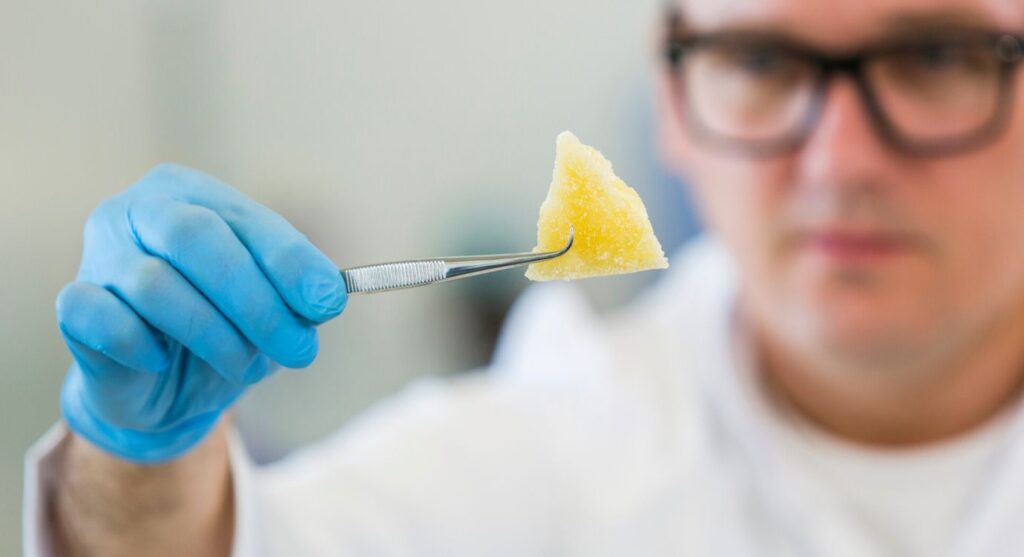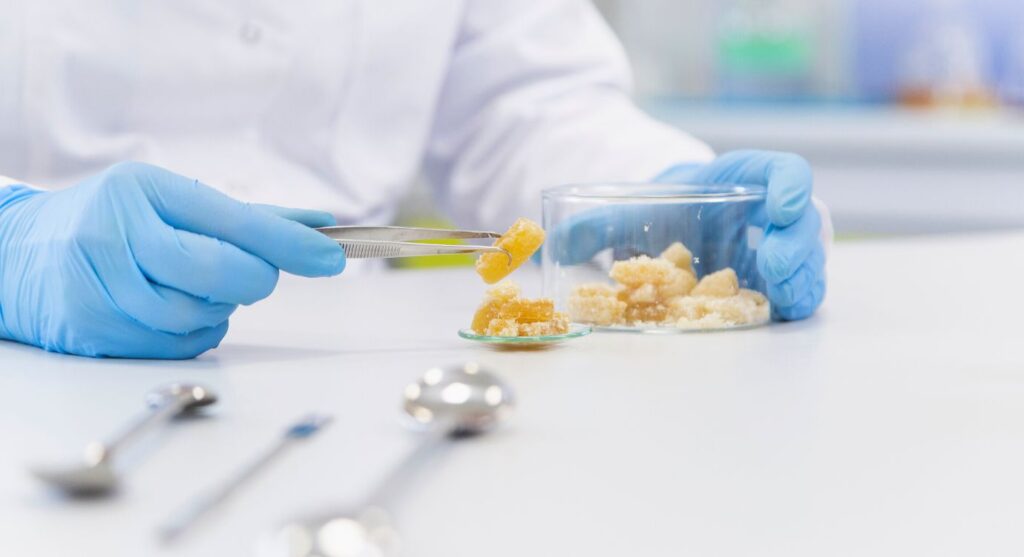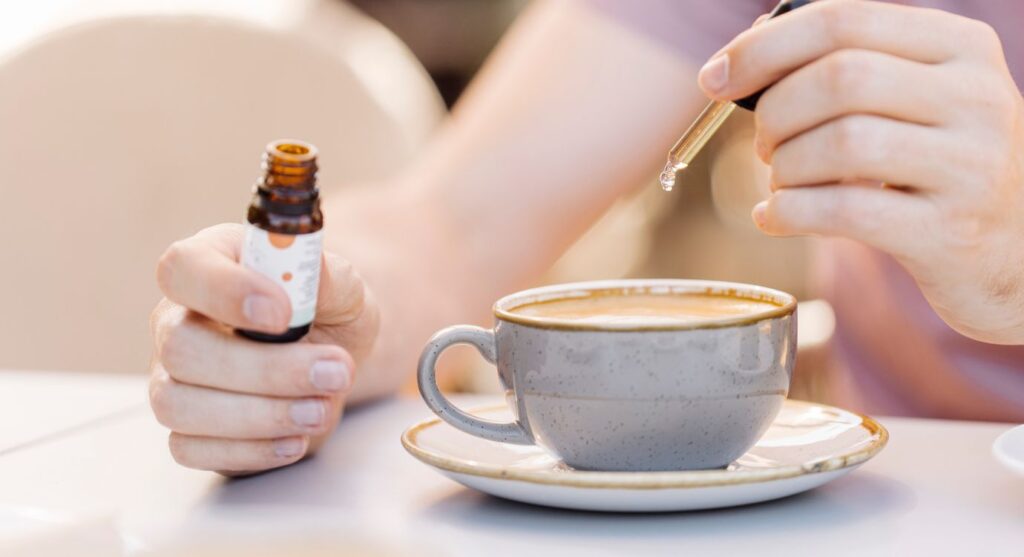Free delivery on all orders over £45
Free delivery on all orders over £45

Medically reviewed by
CBD isolate is a type of CBD – a phytocannabinoid which can be extracted from cannabis and hemp plants.
Isolates are often touted as the purest types of CBD – due to the fact they are chemically stripped to eliminate any other cannabinoids or compounds.
While CBD isolate has its drawbacks (more on that later), it can be a great option for people who want to try CBD but don’t want to ingest any traces of THC whatsoever.
Intrigued?
In this guide, we’ll explore:
Let’s dive in….
CBD isolate is one of the three types of CBD available.
The term “isolate” refers to any compound in its purest form, with these products including a single compound only.
In the world of CBD, isolate products contain the purest form of cannabidiol, without any other cannabinoids, flavonoids, fatty acids, terpenes or other compounds. CBD isolate is also THC-free and does not produce a psychoactive effect.
CBD isolate looks like a white, powdery or crystalline substance that contains 99% CBD.
This is not to be confused with CBD distillate.
Rewind! But what exactly is CBD distillate?
Put simply, it is a distilled, relatively-pure form of CBD but slightly less refined than CBD isolate.
10% off on your first order
Complete this one-minute quiz and find the right products for you.
The journey from the organic hemp plant to CBD isolate involves several steps, which can involve various processes and procedures.
Here’s how it works.
Step 1: Extraction
The first step when making any concentrate is extraction – removing the CBD from the plant. Typically, ethanol extraction is favoured when producing CBD isolate.
Read more: How is CBD extracted?
Step 2: Winterisation
Winterisation is a process by which the extracted compound is cooled to sub-zero temperatures using a solvent. This removes all fats, waxes and chlorophyll from the extract – leaving what’s called a miscella.
Step 3. Filtration
The fats and waxes that have been separated now need to be filtered using a filter press with the assistance of a vacuum pump. These are collected in one vessel and the desired miscella in another.
Step 4: Decarboxylation
Decarboxylation is the next step, achieved by next applying heat in a reactionary vessel. It’s a really important part of the process, as it removes carboxylic acid and CO2 from cannabinoids present in the extract.
Step 5: Distillation
After decarboxylation, the distillation process can now begin. This removes unwanted ingredients such as remaining chlorophyll, fats, lipids and terpenes from the CBD mixture.
This process also separates the CBD compound from contaminants and other cannabinoids.
Step 6: Crystallisation
Crystallisation is optional. With crystallisation, the structure of the CBD isolate is changed to become crystalline.
How is this done?
Well, the distilled product is mixed with a non-polar solvent. Next, it is exposed to heat, converting it into the crystal form of CBD isolate.
The same polar solvent is again used to remove the remaining contaminants from the mixture. Finally, it is placed in a vacuum oven for two days.
Depending on choices made in the refinement process, the end product could be small crystal pieces (if the product goes through crystallization) or a fine white powdery substance (if the process is finished after the distillation step).
Either way, the CBD isolate you are left with will have no discernible smell or taste. (Perfect for those who aren’t a fan of the earthy taste of CBD oil!)

As it is odourless and tasteless, there are many ways you can use CBD isolate.
The easiest way is to place it under your tongue, like a tincture. This is one of the best ways to take CBD in terms of bioavailability, as CBD is rapidly absorbed into the bloodstream through the blood vessels under the tongue.
You could also add CBD isolate oil to CBD superfood smoothies and juices. This makes it easier for users to take their daily dosage in a healthy way.
Another thing to consider is that CBD oil has a higher bioavailability when it is taken with fat-soluble substances.
In fact, many users pour a few drops of CBD oil into their morning tea or make a CBD coffee to get the daily dosage.
Read more: How to make CBD tea
There is no recommended dose for CBD isolates. That said, ensure you never consume more than 70mg of CBD, in line with the FDA’s maximum dosage guidelines.
But, if you are taking CBD for the first time, talk to a medical professional to determine the perfect dose for you.

There are several benefits associated with CBD isolate products, including
This is a refined CBD product, which means it doesn’t have any discernible smell or taste without the earthy and woody fragrance of other CBD products such as terpenes.
Although manufacturers offer isolated products with added flavouring, you can buy the unflavoured CBD oil if you don’t want any taste at all.
The benefit of CBD isolates most commonly promoted by product manufacturers is that it allows you to avoid the psychoactive THC compound altogether, as isolates contain nothing but the purest form of CBD.
If you are regularly drug tested – for example, for work – this makes consuming isolates a good option.
Having said that, this is also largely true of broad-spectrum CBD products, as long as you purchase products from reputable brands.
Read more: CBD drug tests
It is easy to know how much CBD you are taking when you take it in its isolated form. As there is only one ingredient in the product, you can establish the regular dosage easily.
Of course, this is also possible with broad-spectrum CBD products – which should always come with a comprehensive ingredients list and full lab reports.
It’s time… to choose your fighter.
We’ve learned what CBD isolate is, whizzed through the complex chemical formulation and extraction processes, and pointed out some benefits of CBD isolate.
But how do isolates stack up against broad-spectrum CBD oils, like those we sell at Evopure, and CBD-rich full-spectrum oils?
Let’s take a look.
Full-spectrum CBD oil (FSO) is CBD oil packed full of natural goodness.
Cheerleaders for CBD isolate often refer to isolates as the ‘purest’ form of CBD. While this might technically be true, FSO is the product that most closely resembles the plant it is extracted from.
FSO is CBD-rich and contains other cannabinoid compounds (such as CBGa, and CBN), as well as flavonoids and terpenes that occur naturally in cannabis and hemp plants.
FSO also contains THC – up to a legal limit of 0.2% in the UK. This tiny amount of THC will not make you feel ‘high’ or trigger psychoactive effects – as long as you buy products from reputable sellers.
Whether you prefer CBD isolate or FSO will depend on your priorities.
FSO will allow you to benefit from the entourage effect – this theory suggests that CBD works best as a therapeutic aid when ingested alongside other cannabinoids and compounds in cannabis and hemp plants.
Read more: Entourage effect
Isolates, on the other hand, will not allow you to benefit from the entourage effect – as the product you are consuming will be solely CBD.
However, if you are regularly drug tested – or absolutely do not want to consume any THC whatsoever (regardless of whether it will offer psychoactive effects) – CBD isolate might be your preferred choice.
So, in the battle of CBD isolate vs full-spectrum CBD oil – the winner will depend on your priorities.
Broad spectrum oils are essentially the same as full-spectrum oils, but with one key difference – THC has been removed from the product.
Broad spectrum oils still contain all the goodness that comes from flavonoids, terpenes and other cannabinoids – but allow you to consume these compounds without consuming THC.
As such, we at Evopure see broad-spectrum products as the best of both worlds – you can be safe knowing you aren’t consuming THC while still benefiting from the entourage effect.
However, we will offer a warning here.
There are many low-quality products on the market manufactured by sellers who don’t really care about their customers. They may be selling ‘broad-spectrum’ oils which contain more THC than they state on the label.
As such, always do your due diligence – ensure your product has been third-party lab-tested and comes with a certificate of analysis and an ingredients list.
CBD isolate can be a great option if you want to be 100% sure that you are not consuming any THC.
However, despite being the ‘purest’ form of CBD, they are also the most chemically removed from their original form – that of a natural phytocannabinoid found in cannabis and hemp.
As it’s easiest for brands and manufacturers to get CBD isolates approved and to market (because they are ‘stable’ compounds), there’s been a massive surge in CBD isolates on the market in recent years.
At Evopure, we only sell broad-spectrum products. And while that likely makes us a little biased, we sell broad-spectrum CBD for a reason.
So, our customers have access to organic, natural and sustainable CBD, packed full of therapeutic benefits while being free from THC.
Sign up for the Evopure newsletter:
This product is not for use by or sale to persons under the age of 18. It should not be used if you are pregnant or nursing. Consult with a physician before use if you have a serious medical condition or use prescription medications. A Doctor’s advice should be sought before using this and any supplemental dietary product. This product is not intended to diagnose, treat, cure or prevent any disease.
© Evopure Ltd. All rights reserved Terms & Conditions Cookie Policy Sitemap